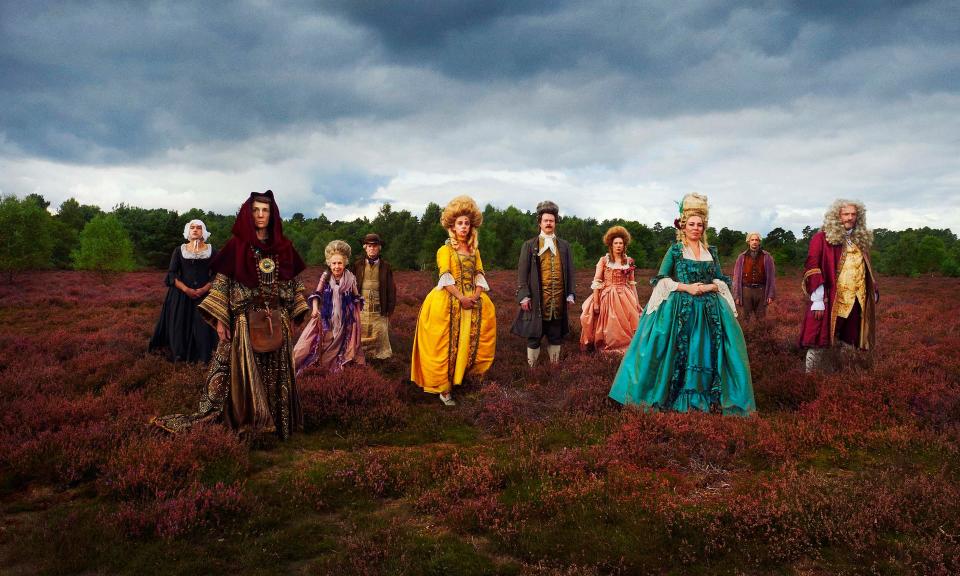Flowers, a quiet comedy with the feel of a melancholy fairytale, is strikingly brilliant

Flowers, since the beginning, has always had something of the feel of a fairytale.
Most obviously, Flowers evoked this feeling through the Grubbs, the storybook monsters created by children’s author Maurice Flowers (Julian Barratt). Narration from the Grubbs stories bookend the series, linking the series to the style and sensibility of children’s literature, and positioning Flowers within “a weird reverie of dark revelation”. A connection is drawn between these fantasy-like elements, the “strange sensation”, and Maurice’s depression; this “little strange book” and the characters within it are a representation of the family, or an attempt at a more open version of them at least, offering up that dark revelation.
The second series of Flowers, a piece which is very much in conversation with its predecessor, continues to evoke the feel of a fairytale – approaching it, however, from a different aesthetic. As writer and director Will Sharpe (who also plays Shun, the Flowers’ live-in illustrator) noted, Flowers draws on “a pagan and mystical heritage”, and that’s something the second series really emphasises. Broader in scope than series 1, moving its focus from Maurice to his daughter Amy, Flowers series 2 builds itself around the aesthetic of the aforementioned “pagan and mystical heritage”. There’s a new, warmer colour palette, in keeping with the summer setting; it’s evocative of the world of faerie, positioning mental health issues within that liminal space.
As a result, there’s a different energy to Flowers’ second series – it’s now less a haunting reverie and more of a wild rush. Indeed, something that’s worth remarking on about Flowers, and is perhaps less often spoken about, is the editing; much of Flowers comes down to the experience of watching it, the feeling of that wild rush, and that’s created in no small part by Selina Macarthur’s editing. [Expand?] The show masters tone such that it is, in some respects, less a television series and more of an experience – the texture and the feel of the show is, arguably, one of the most impactful things about it.

It’s debatable, of course – and it has been debated a lot – just how much Flowers actually is a comedy. The series does, after all, open with a failed suicide attempt; in its dealings with depression and mental illness, the show engages with a subject matter that isn’t exactly a sitcom staple.
Creator Will Sharpe commented on the genre debating surrounding Flowers, noting that “I’m quite comfortable calling it a comedy-drama, because I think it contains both. But I definitely wouldn’t call it a drama, because these are comedy characters first and foremost and the engine of the story is more often than not comedic, even if it takes us to a difficult place.” In essence, then, the series is taking comedic archetypes – or, rather, starts with comedic archetypes – and creates humour through putting them in situations they’re ill-suited to. It’s a deft bit of genre work, typical of a show that’s able to move between poignant grief and slapstick comedy, sometimes on a line-to-line basis. Indeed, part of the frisson of Flowers is the way that it can encompass such a vast range of emotions; it’s this intensity that contributes to, as noted above, the heightened experience of watching Flowers, a show that’s never just one thing at any given point.
But, of course, that debate over genre does obscure something about Flowers: it is, in fact, actually very funny.
Part of this is down to its cast, each of whom are perfect for their parts; for one thing, Flowers serves as a reminder of Olivia Colman’s comedic skills, sometimes forgotten amongst her recent work that’s tended more towards serious drama. Really, though, it’s a mistake to highlight any one cast member above the others, given how much Flowers benefits from its ensemble; from Daniel Rigby’s performance, which is far subtler than it initially appears, to Julian Barratt’s brilliant portrayal of Maurice Flowers that anchored the first series, to Sophia di Martino’s Amy, wisely given more space in the second instalment, Flowers is elevated time and time again by the strength of its leads.
Also, though, there’s the sharpness of the writing. Writer and director Will Sharpe manages to, as already noted, strike a difficult balance, creating a comedy that defies easy categorisation. What’s also notable, though, is that Sharpe plays a role himself – Shun, the Flowers’ live-in illustrator who works on the Grubbs with Maurice. While you can’t highlight any one cast member above the others, Shun feels something of a special case; he feels at something of a remove from the rest of the characters, in part because he’s played by Sharpe, but also holding a certain narrative significance that makes him unique. There’s a sense that Shun, in a way, holds the key to it all – note, after all, that for all the series’ reliance on elements of magical realism, Shun is the only one to interact with them directly.
Ultimately, then, Flowers is something quite special – a quiet comedy with the feel of a melancholy fairytale, it’s a programme that’s strikingly brilliant from start to finish. To borrow a phrase from the show itself, Flowers is “a single buttercup in a pile of faeces”.
Related:
How The Good Fight found clarity in chaos and answers in absurdity
Like this article? Hate this article? Why not follow me on twitter for more, or send me a message on facebook to tell me what you thought? You can also find more of my articles for Yahoo here, or check out my blog here.

 Yahoo Movies
Yahoo Movies 

